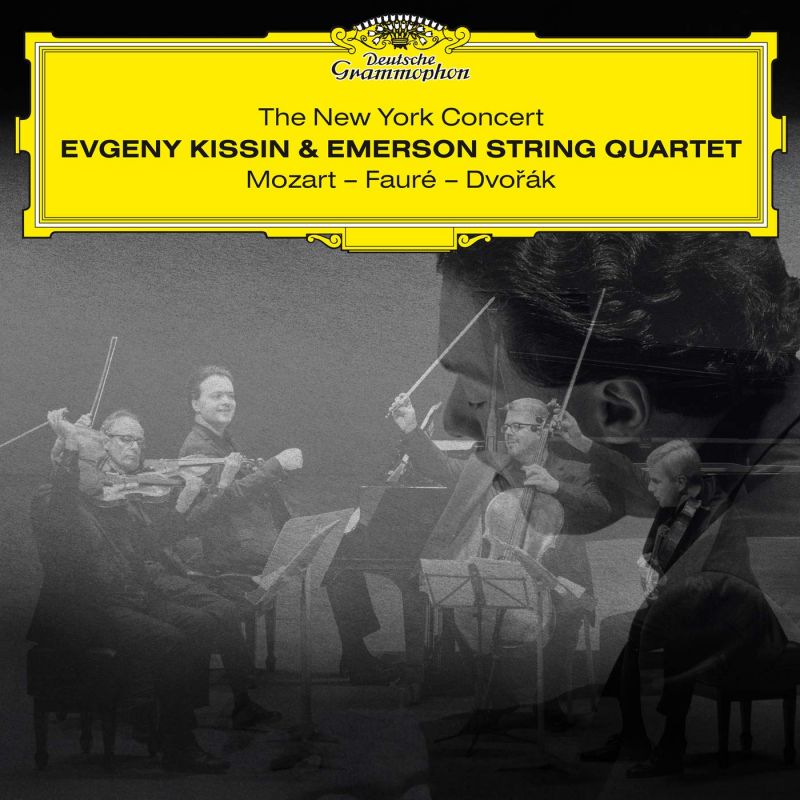The New York Concert
View record and artist detailsRecord and Artist Details
Composer or Director: Dmitri Shostakovich, Antonín Dvořák, Wolfgang Amadeus Mozart, Gabriel Fauré
Genre:
Chamber
Label: Deutsche Grammophon
Magazine Review Date: 06/2019
Media Format: CD or Download
Media Runtime: 99
Mastering:
DDD
Catalogue Number: 483 6574GH2

Tracks:
| Composition | Artist Credit |
|---|---|
| Quintet for Piano and Strings |
Antonín Dvořák, Composer
Antonín Dvořák, Composer Emerson Quartet Evgeny Kissin, Piano |
| Quartet for Piano and Strings No. 1 |
Gabriel Fauré, Composer
Emerson Quartet Evgeny Kissin, Piano Gabriel Fauré, Composer |
| Quartet for Keyboard, Violin, Viola and Cello |
Wolfgang Amadeus Mozart, Composer
Emerson Quartet Evgeny Kissin, Piano Wolfgang Amadeus Mozart, Composer |
| Quintet for Piano and Strings, Movement: Scherzo |
Dmitri Shostakovich, Composer
Dmitri Shostakovich, Composer Emerson Quartet Evgeny Kissin, Piano |
Author: Harriet Smith
The set is launched with a striking reading of Mozart’s G minor Piano Quartet, its already dramatic beginning given an even more chiselled profile thanks to the precision of the Emerson and Kissin’s vehement accentuation. The Andante’s opening comes across as a bit foursquare in Kissin’s hands – compare this with the charm of Paul Lewis or the flowing lines of the recent Skride Quartet version (see page 58). And in the finale, the new set can’t compare with Lewis and the Leopold String Trio, who find wit and joy in abundance, alongside which this new set is somewhat po-faced, though technically immaculate.
Kissin has of late been turning his attention to French music in the concert hall – I recently heard him playing a selection of Debussy Préludes that came out sounding curiously Russian. So I was intrigued to hear what he and the Emerson players did with Fauré’s First Piano Quartet. In terms of attention to detail and all matters technical they operate on a very high level. But while they capture the Romantic fervour of the first movement, it has a kind of heartiness that underplays the moments of fragility: how much more effective are the Capuçon brothers with Dalberto and Caussé, despite a nasty recorded sound. The Scherzo has plenty of energy and lightness, particularly from the string players, though occasionally Kissin’s accentuation weighs the music down somewhat – especially when compared with Domus’s light-as-thistledown playing, which still sounds fresh more than three decades on. But in the slow movement, with its tolling piano accompaniment, the Emerson and Kissin are powerfully effective, bringing a palpable air of grief to the music, while the strings entwine beautifully as the music warms (disc 1, track 6, from 1'52"). The finale has all the churning sense of turmoil that you could want; but turn to Domus and you immediately feel that their greater airiness is much more in the spirit of the composer.
The Emerson’s previous recording of the Dvořák A major Quintet had cellist David Finckel, now replaced by Paul Watkins. And, of course, in Menahem Pressler it had one of the most experienced of chamber pianists. The differences between their two accounts are apparent less than half a minute into the first movement, with a slight hesitation from Kissin that isn’t in the earlier account. The discourse proceeds with a steely intent from all concerned, but it lacks the warmth of the Pavel Haas Quartet with Boris Giltburg (sample the duetting between piano and strings – disc 2, track 1, 4'12" on the new set – which is far less gentle than from the PHQ/Giltburg). The Dumka second movement throws up more differences: Pressler is beautifully fragile here, the Emerson’s viola echoing and extending this mood. By comparison, Kissin is merely ponderous. Giltburg is far more subtle, and he and the PHQ dare to withdraw their sound to magical effect. The Emerson’s new account comes more alive in the sprightly writing (for instance, from 7'38") but they don’t reach the level of playfulness of the Elias Quartet with Jonathan Biss. The Furiant has a real drive to it, the technical issues holding no fear for these players, but compared to the Emerson’s earlier account this is a little lacking in exuberance. And the finale is also rather weighed down by Kissin’s accentuation – at times it feels somewhat like a piano concerto with supporting strings.
The more effective piece is the encore: the Scherzo from Shostakovich’s Piano Quintet, where all concerned let rip to bracingly dramatic effect.
Discover the world's largest classical music catalogue with Presto Music.

Gramophone Digital Club
- Digital Edition
- Digital Archive
- Reviews Database
- Full website access
From £8.75 / month
Subscribe
Gramophone Full Club
- Print Edition
- Digital Edition
- Digital Archive
- Reviews Database
- Full website access
From £11.00 / month
Subscribe
If you are a library, university or other organisation that would be interested in an institutional subscription to Gramophone please click here for further information.




